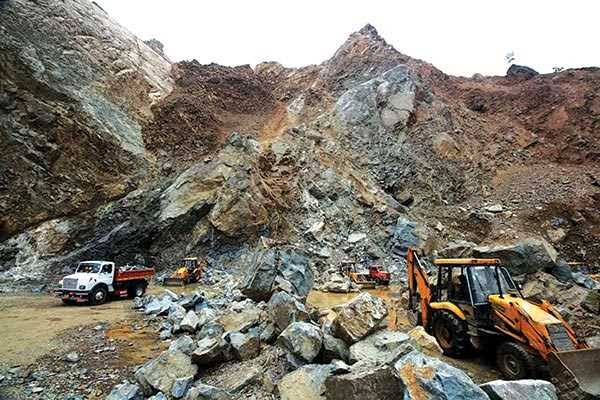
In the Dachna area of Salamabad in Uri, located nearly 60 kilometers from the district headquarters of Baramulla in north Kashmir, massive protests have broken out against relentless gypsum mining activities.
On Saturday, a large number of men and women from the village took to the streets, blocking the movement of bulldozers that have been mining gypsum under the cover of darkness.
The protests began last night, with residents of Dachna and nearby villages continuously demonstrating to demand the closure of gypsum mines in the area. The villagers argue that the ongoing mining operations are severely affecting their health and environment.
“There has been an increase in respiratory ailments, largely due to gypsum mining. Our hospitals have seen a rise in such cases,” a local resident told The Kashmiriyat.
Medical officials have confirmed this, noting a significant rise in respiratory disorders in the area.
“Environmental pollution may also be contributing to other lung-related issues,” one official stated. Data from August 2023 revealed that the primary health center in Boniyar received 55 cases of tuberculosis from Bagna and surrounding areas, indicating a worrying trend.
Experts suggest that wastewater from mining operations may also be a major source of pollution, further complicating the health crisis. In addition to respiratory issues, the locals are also grappling with contaminated water and sleep disorders.
“Other than the noise pollution from earthmovers and JCBs, we also consume contaminated water because gypsum from the mountains mixes with our water supply,” explained Aadil Khan, a resident of the area.
The environmental degradation caused by the mining has also had other serious repercussions.
According to locals, the deforestation resulting from mining activities has led to frequent landslides during the rainy season.
Some villagers have reported that their houses have developed cracks, and that their crop yields have decreased as a result.
Dr. Sajad Shafi Uri, JKNC District President of Baramulla visited the area and urged the administration to investigate and take immediate action to halt the mining operations.
As per news reports, a report submitted to the Deputy Commissioner of Baramulla in September 2022 by the then Sub-Divisional Magistrate recommended that all 12 mining units within 1 kilometer of the Lachipora Wildlife Sanctuary should be shut down.
This recommendation was in line with a Supreme Court ruling from June 2022, which stated that no mining activity should be allowed in wildlife sanctuaries and national parks, and that mining should only take place beyond the 1-kilometer eco-sensitive zone (ESZ), however, this directive is not being enforced on the ground, locals said.
The official report further highlighted that four of the 15 leased gypsum mines in the area fall entirely or partially within the protected Lachipora Wildlife Sanctuary, with one located within the ESZ.
The only gypsum mine outside the ESZ is located in Salamabad Dachina.
Despite these concerns, mine leaseholders assert that their operations are legal and provide employment opportunities for local residents.
The villagers are increasingly worried about the long-term implications of the ongoing mining activities. As one resident put it, “This is not just about us; we might survive this, but this is about our future generations– the future of Kashmir.”




